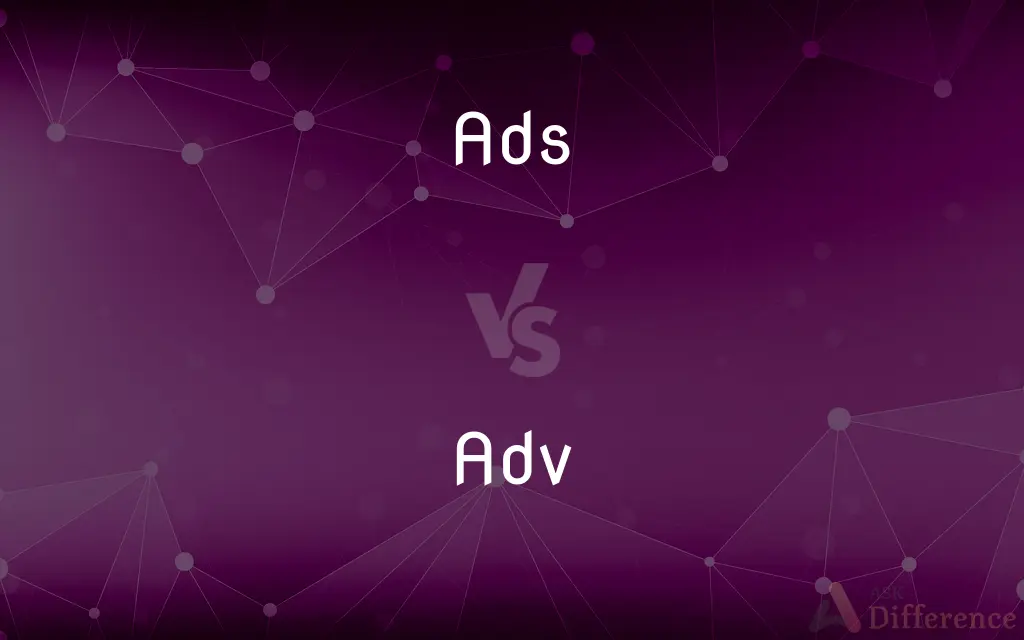Ads vs. Adv — What's the Difference?
By Tayyaba Rehman & Fiza Rafique — Updated on March 30, 2024
Ads are short for advertisements, focusing on promoting products or services through various media. Adv, often shorthand for "advantage," emphasizes the beneficial aspect of something in comparisons or discussions.

Difference Between Ads and Adv
Table of Contents
ADVERTISEMENT
Key Differences
Ads, or advertisements, are designed to capture the audience's attention and persuade them to purchase products or services. They are a key component of marketing strategies, appearing in multiple forms such as TV commercials, online banners, and print media. On the other hand, Adv is commonly used to denote "advantage," highlighting a favorable or beneficial feature that distinguishes an item, idea, or situation from others. It is often used in contexts where comparison or competition is involved, emphasizing superiority or desirability.
Ads aim to create a memorable impact on the consumer, often employing creativity, humor, or emotional appeals to establish brand awareness and loyalty. Whereas, the concept of Adv revolves around the intrinsic value or superiority of something, which can be a decisive factor in decision-making processes, particularly in competitive scenarios.
While ads are an outward expression designed to influence external perception and behavior, Adv is more of an internal attribute or benefit that offers a competitive edge or adds value to something in a comparative context.
Advertisements are subject to regulations and standards that govern their content, truthfulness, and presentation, ensuring that they are appropriate and not misleading. Conversely, an Adv (advantage) is a subjective evaluation that depends on individual perspectives or specific criteria, which may vary widely from one situation to another.
Ads require significant investment in terms of time, creativity, and money to reach their target audience effectively and achieve their marketing objectives. In contrast, an Adv is a characteristic or feature that inherently exists or is developed within a product, service, or situation, requiring recognition and articulation to be leveraged effectively.
ADVERTISEMENT
Comparison Chart
XDefinition
Marketing tools aimed at promoting products or services.
A beneficial feature that provides superiority in a comparison.
Purpose
To inform, persuade, or remind customers about a product or service.
To highlight superiority or desirability in a comparative context.
Context
Marketing and media.
Comparative discussions or analyses.
Evaluation
Subject to industry standards and regulations for truthfulness and appropriateness.
Based on subjective evaluation or specific criteria highlighting superiority.
Required Investment
Financial, creative, and temporal resources to reach and impact the target audience.
Recognition and articulation of an inherent or developed feature or benefit.
Compare with Definitions
Ads
Commercial messages paid for by businesses to reach a wide audience.
Social media platforms are full of ads targeting young consumers.
Adv
A condition or circumstance that puts one in a favorable or superior position.
Having access to advanced technology gives the company a competitive adv.
Ads
Public announcements in various media formats aiming to influence consumer behavior.
Billboard ads in the city center grab a lot of attention.
Adv
Superiority or dominance in a particular field or market.
In terms of speed, this processor has an undeniable adv.
Ads
A tool for building brand awareness and loyalty among consumers.
Creative ads can make a brand memorable to its target audience.
Adv
The benefit or gain from a particular situation or action.
The new policy offers a clear adv to first-time home buyers.
Ads
A form of marketing communication used to promote or sell a product, service, or idea.
The latest car ads showcase advanced safety features.
Adv
The upper hand in a competition or comparison.
Their in-depth market research provided them with a significant adv.
Ads
Persuasive messages designed to inform potential customers about new products.
TV ads during prime time are priced higher due to the large audience.
Adv
A feature that makes something more desirable than alternatives.
The product's energy efficiency is a major adv over competitors.
Ads
An advertisement.
Adv
Abbreviation of adverb
Ads
An advantage in tennis.
Ads
Plural of ad
Common Curiosities
What are ads?
Ads, or advertisements, are marketing messages aimed at promoting products, services, or ideas to a target audience.
How are ads regulated?
Ads are regulated by various agencies and laws that ensure they are truthful, non-deceptive, and appropriate for their audience.
What does Adv stand for?
Adv often stands for "advantage," referring to a beneficial feature that provides superiority in a comparison.
Can advantages change over time?
Yes, what constitutes an advantage can change due to market dynamics, consumer preferences, and technological advancements.
Can an advertisement have an advantage?
Yes, an advertisement can highlight the advantages of a product or service, making it more appealing to consumers.
What factors contribute to an advantage?
Factors contributing to an advantage can include superior technology, cost-effectiveness, brand reputation, and unique features.
How do you determine an advantage?
Determining an advantage involves comparing features, benefits, and value against competitors or alternatives.
Why is an advantage important?
An advantage is important because it differentiates an item or situation in a positive way, often influencing decision-making in its favor.
How do ads work?
Ads work by capturing attention, conveying messages, and persuading consumers to make purchases or take specific actions.
Are all ads paid for?
While most ads are paid for by advertisers, some forms of advertising, like certain online content, can be organic or unpaid.
What's the difference between digital and traditional ads?
Digital ads appear online and offer targeting and analytics, while traditional ads include print, TV, and radio, reaching broader audiences.
What role do ads play in marketing?
Ads play a crucial role in marketing by building brand awareness, generating leads, and driving sales.
How can businesses leverage their advantages?
Businesses can leverage their advantages by highlighting them in marketing materials, product development, and strategic planning.
What impact do effective ads have?
Effective ads can significantly impact consumer behavior, leading to increased interest, engagement, and sales for a brand or product.
Is an advantage always objective?
While some advantages are based on objective criteria, others can be subjective and vary based on personal or situational perspectives.
Share Your Discovery

Previous Comparison
Pattings vs. Tattings
Next Comparison
Gentle vs. HarmlessAuthor Spotlight
Written by
Tayyaba RehmanTayyaba Rehman is a distinguished writer, currently serving as a primary contributor to askdifference.com. As a researcher in semantics and etymology, Tayyaba's passion for the complexity of languages and their distinctions has found a perfect home on the platform. Tayyaba delves into the intricacies of language, distinguishing between commonly confused words and phrases, thereby providing clarity for readers worldwide.
Co-written by
Fiza RafiqueFiza Rafique is a skilled content writer at AskDifference.com, where she meticulously refines and enhances written pieces. Drawing from her vast editorial expertise, Fiza ensures clarity, accuracy, and precision in every article. Passionate about language, she continually seeks to elevate the quality of content for readers worldwide.














































